Alcohol Use and Childhood Trauma
Research shows that adults who've experienced childhood trauma have much higher rates of alcohol use. When people use alcohol to cope with pain or anxiety, it's not because they have a disorder, but because they don't feel safe in their bodies.

Dr. Nicole LePera
#1 New York Times Bestselling Author “How To Do The Work”(https://t.co/HF3UY9ia4Q) Founder of @selfhealerscirc 👇🏼Join Waitlist 👇🏼

-
When people use alcohol to cope with pain or anxiety, it's not because they have a disorder. It's because they don't feel safe in their bodies.
— Dr. Nicole LePera (@Theholisticpsyc) March 3, 2023
Let's talk about alcohol as self soothing: -
Research shows that adults who've experienced childhood trauma have much higher rates of alcohol use.
— Dr. Nicole LePera (@Theholisticpsyc) March 3, 2023 -
"In conclusion, our results indicate that exposure to childhood trauma, in particular emotional and physical abuse, may be a particularly significant risk factor for the development of severe alcohol dependence."https://t.co/zTV7gPkSL9
— Dr. Nicole LePera (@Theholisticpsyc) March 3, 2023 -
Emotional and physical abuse can include:
— Dr. Nicole LePera (@Theholisticpsyc) March 3, 2023
- emotional neglect by parent figures
- parentification (being parent to your parent)
- shaming, name calling
- witnessing dysfunctional relationships or violence
- harsh punishment
- emotionally immature parents -
Child experiences that set the foundation for:
— Dr. Nicole LePera (@Theholisticpsyc) March 3, 2023
- how we cope with stress
- how safe we feel around other people
- how we regulate our emotions
- how our nervous system functions
- our brain development (including our amygdala: how we process fear) -
2 Core Common Responses To Childhood Trauma:
— Dr. Nicole LePera (@Theholisticpsyc) March 3, 2023
1. Hypervigilance: a fight or flight response where we're scanning the environment for threats (noticing people's change in mood, voice, facial expressions). -
2. Dissociation: a freeze state of the nervous system where we're physically present but mentally gone to avoid threats or danger.
— Dr. Nicole LePera (@Theholisticpsyc) March 3, 2023 -
When we don't feel safe in our bodies, being around other people can feel dangerous or highly anxiety provoking.
— Dr. Nicole LePera (@Theholisticpsyc) March 3, 2023
This is often labeled as: 'social anxiety disorder.' -
In order to feel safe in new situations and around new people we need to be in a ventral vagal (connected) nervous system state.
— Dr. Nicole LePera (@Theholisticpsyc) March 3, 2023
You can see ventral vagal at the top of this ladder: pic.twitter.com/wXfNjj06kN -
It make sense that when we don't feel safe in our bodies, alcohol becomes a numbing coping mechanism.
— Dr. Nicole LePera (@Theholisticpsyc) March 3, 2023
Alcohol shuts down our central nervous system or threat system that feels so uncomfortable and brings on anxiety. It also shuts down the racing thoughts. -
The more we drink, the less we feel that danger response in our body. This is why people continue to drink even with negative consequences.
— Dr. Nicole LePera (@Theholisticpsyc) March 3, 2023
When sober, the racing thoughts in the mind and the physical sensations in the body intense. -
While this isn't a healthy response, it makes sense that we would use alcohol because the body is always seeking ways to self soothe.
— Dr. Nicole LePera (@Theholisticpsyc) March 3, 2023
Without learning healthy coping mechanisms, we'll adapt to any coping mechanism that gives us temporary relief. -
Underneath the use of alcohol is a desire to:
— Dr. Nicole LePera (@Theholisticpsyc) March 3, 2023
- escape painful memories
- numb feelings of isolation and loneliness
- soothe the nervous system
- escape symptoms of C-PTSD
- avoid our thoughts (harsh inner critic)
- feel like we belong -
Using alcohol to numb is a survival strategy.
— Dr. Nicole LePera (@Theholisticpsyc) March 3, 2023
It's our attempt to soothe the dysregulation in the body and mind. To escape our own thoughts. And to manage the unprocessed pain that comes from a distorted self image. -
Follow: @Theholisticpsyc
— Dr. Nicole LePera (@Theholisticpsyc) March 3, 2023
I write threads every day on how to heal yourself.
Join the waitlist for SelfHealers Circle https://t.co/dqXv0WErsa
My new workbook:https://t.co/cfspkMcbGB
